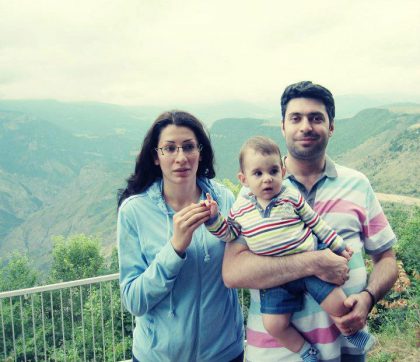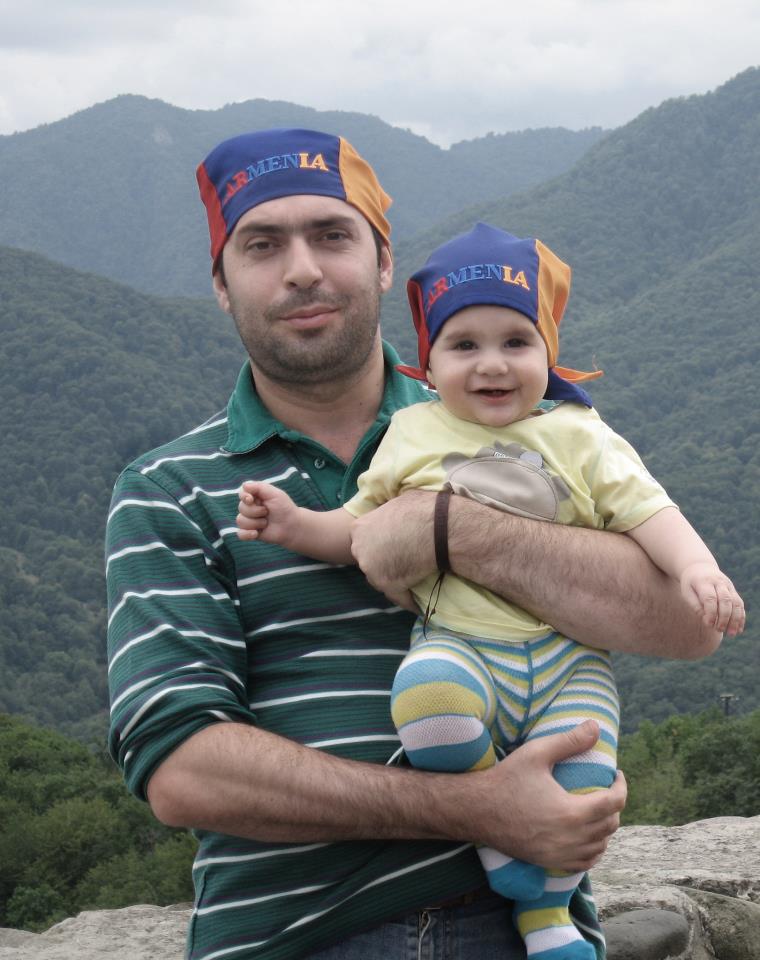
 The repatriation story of the former Deputy Minister of Diaspora
The repatriation story of the former Deputy Minister of Diaspora
Margarita Hovhannisyan
Azad-Hye
In 2010, Vardan Marashlyan, the former Deputy Minister of Diaspora, decided to leave the Russian Federation and settle down in Yerevan, Armenia.
“In 1980, when I was five years old, my family moved to Moscow. I lived there for 25 years. My first attempt to settle in Armenia was in 1998, I stayed till 2001. In 2010, I moved here with my family for good. My second child, Grigor was born in Yerevan, but Mariam was already two years old. It was so important to provide a good environment for my children to grow up in. I was positive that the atmosphere would be much warmer here”.
Let's find out what kind of surprises Armenia had for V. Marashlyan.
“Since 2010, I haven't encountered any serious surprises, neither positive nor negative, because I had frequently visited Armenia before settling for good. I had already gotten acquainted with all of its aspects. I can mention one nice surprise though; upon my return, I was very happy to see that most of the repatriates from 1998 were still living there and had no intention whatsoever to leave the country.
In order to feel part of the society here, besides getting in touch with the public organizations, one should also interact with his compatriots who had come from his own country and settled in Armenia”.
From Moscow to the Ministry of the Diaspora, how did this happen?
“I have always dedicated most of my time to issues that concerned Armenia. I have actively participated in the foundation and development of a few Armenian youth organizations. Later, I was invited to work in the Ministry of Diaspora. It was the perfect place for me to practice the experience and knowledge I had gained in the Russian Diaspora”.
According to the former Deputy Minister, in order to incite repatriation, we should work with the Armenians of Armenia as well, explaining that those who move to Armenia, bring with them new information, new relations, possibilities and why not also finances, which will create more favorable conditions for the development of Armenia.
“We should break the stereotypes and the negative information in the Diaspora and Armenian media about being Armenian from Armenia. It is necessary to discuss the issues not under the influence of false reports but rather in normal and favorable conditions?.
Relocation is like a “flood”
By giving a personal example, he admits that it is not so easy to change someone's living place and work area at a young age. Relocation is typically like a flood.
“You restart everything from scratch. Many organizational and domestic problems will come up. Repatriation gives way to different opinions and interpretations. I can't help but use humor when I don't know how to answer those who ask me questions about why I moved from a 'developed' country to Armenia?.
Marashlyan feels bad that many Diaspora Armenians do not understand that it is not enough to visit Armenia occasionally with the kids in order to raise them as Armenians.
“There are many examples in front of me as to how many strong families have gotten assimilated in the Diaspora, especially in Russia. We should realize that only by repatriation one can guarantee the survival of his national identity and not by visiting, no matter how often that might be.”
Marashalyan believes that we should be happy to have an independent state, something that our forefathers have only dreamed about.
“We should not forget that in order to reinforce the independence, we should upgrade this 42.000 square km area by changing its qualitative and quantitative image. Of course, the role of the repatriates will be distinctive in this process.”
?And
“Armenia gave me an interesting job and gave my family a proper environment. Grigor and Mariam will grow up on their own land, in their home; they will master the Armenian language way better than their own parents have”.
Translated by Nanor Mikayelian
Biographical notes about Vardan Marashlyan
Vardan G. Marashlyan was born on July 8, 1975 in Yerevan.
In 1992, he graduated from School N345 of Moscow.
In 1997, he graduated from the Academy of Finance under the RF Government with a degree in “World Economics”.
In 2000, he graduated as a candidate of economic sciences from Moscow State University. He is an author of 8 scientific publications.
From 1995 to 1998, he has worked in the Russian banking sector.
From 1999 to 2000, he has worked as assistant to the RA Minister of Economy.
From 2000 to 2001, he has worked as an expert at “International Center for Human Development” NGO.
From 2001 to 2004, he has worked as an expert of economic policies at the Ministry of International Development of Great Britain.
From 2004 to 2005 he has been vice-president of “Soglasie” CJSC.
From 2005 to 2007 he has been director of the regional development representation of the British “Norman Asset Management” organization.
From 2007 to 2008 he has worked as head of the department of commercial real estate deals at “Promsvyazbank” CJSC.
From 2008 to 2010, he has worked as head of the department of development projects at “R C Group” CJSC.
He is fluent in English and Russian.
Married, has a daughter.
Տեղափոխությունը ?ջրհեղեղ? է. նախկին փոխնախարարի հայրենադարձության պատմությունը
Մարգարիտա Հովհաննիսյան
Ազատ-Հայ
Սփյուռքի նախկին փոխնախարար Վարդան Մարաշլյանը որոշեց ու 2010-ին ընտանիքով վերջնականապես հաստատվեց Հայաստանում` լքելով Ռուսաստանի Դաշնությունը:
?5 տարեկան էի, երբ 1980-ին տեղափոխվեցինք Մոսկվա: Այնտեղ ապրել եմ 25 տարի: Հայաստանում հաստատվելու առաջին փորձն արեցի 1998 -ին եւ Հայրենիքում էի մինչեւ 2001-ը: Իսկ 2010-ին արդեն վերջնականապես ընտանիքով փոխադրվեցինք: Երկրորդ երեխաս` Գրիգորը, արդեն այստեղ է ծնվել, իսկ Մարիամս երկու տարեկան էր այն ժամանակ: Ինձ համար շատ կարեւոր էր, թե ինչ միջավայրում են մեծանալու երեխաներս, իսկ այստեղ իրենք կմեծանան շատ ավելի ջերմ մթնոլորտում?: ?
Թե ի՞նչ անակնկալներ մատուցեց Հայաստանը Վ. Մարաշլյանին՝
?2010-ից հետո լուրջ անակնկալների չեմ բախվել` ո՛չ դրական, ո՛չ բացասական, որովհետեւ նախքան հաստատվելս հաճախակի էի լինում Հայաստանում. այն արդեն ծանոթ էր եւ ուսումնասիրված: Թեեւ, որպես դրական անակնկալ, այնուամենայնիվ, պիտի նշեմ` երբ վերադարձա, հաճելիորեն զարմացա, որ 1998-ից ինձ ծանոթ հայրենադարձների մեծ մասը դեռ ապրում էին այստեղ ու երկիրը լքելու միտք անգամ չունեին: Հետո էլի շատ նոր մարդկանց ճանաչեցի, որոնք ինձ պես հայրենադարձներ էին:
Տեղի հասարակություն ինտեգրվելու համար շատ կարեւոր է, բացի պետական կառույցների հետ շփվելուց, կապեր հաստատել ու փորձի փոխանակում անել նույն երկրից եկած` Հայաստան տեղափոխված հայրենակիցների հետ?: ?
Մոսկվայից` Սփյուռքի նախարարություն
?Անկախ ինձանից` ժամանակիս մի մեծ մասը տրամադրում էի Հայաստանին առնչվող թեմաներին: Ակտիվ մասնակցել եմ մի քանի երիտասարդական հայկական կառույցների հիմնադրմանն ու զարգացմանը: Հետո աշխատանքի հրավեր ստացա Սփյուռքի նախարարությունից: Նախարարությունն այն տեղն է, որտեղ կարող էի կիրառել ռուսաստանյան սփյուռքում կուտակած փորձս ու գիտելիքներս?:
Ըստ նախկին փոխնախարարի` հայրենադարձությունը խթանելու համար հարկ է աշխատանք տանել նաեւ հայաստանցիների հետ` բացատրելով, որ փոխադրվողներն այստեղ գալով իրենց հետ բերում են նոր գիտելիքներ, կապեր ու հնարավորություններ, ինչու ոչ` նաեւ ֆինանսներ, ինչը Հայաստանի զարգացման համար առավել նպաստավոր պայմաններ է ստեղծելու:
?Պետք է կոտրել կարծրատիպերն ու այն բացասական տեղեկատվությունը, որ կա Սփյուռքի ու Հայաստանի ԶԼՄ-ներում` ?հայաստանցիության? մասին: Խնդիրներն անհրաժեշտ է քննարկել ոչ թե թյուր հրապարակումների ազդեցությամբ, այլ նորմալ ու բարենպաստ պայմաններում?: ?
Տեղափոխությունը ?ջրհեղեղ? է
Բերելով անձնական օրինակը՝ խոստովանում է, որ երիտասարդ տարիքում այդքան էլ հեշտ չէ փոխել ապրելու վայրը եւ աշխատանքի ոլորտը: Եւ յուրաքանչյուր տեղափոխություն, նրա բնորոշմամբ, նման է ջրհեղեղի.
?Ամեն ինչ սկսվում է սկզբից ու նորից. առաջանում են շատ ու շատ կազմակերպչական ու կենցաղային հարցեր: Նաեւ տարբեր կարծիքների ու մեկնաբանությունների տեղիք է տալիս հայրենադարձություը: Եւ այն մարդկանց, որոնց հնարավոր չի բացատրել, թե ինչու ես ?զարգացած? երկրից փոխադրվել Հայաստան, ինքս հումորով են վերաբերվում?:
Նա ափսոսում է` սփյուռքահայերից շատերը դեռ չեն պատկերացնում, որ զավակներին անգամ հաճախակի Հայրենիք տանել-բերելով հնարավոր չէ պահպանել հայ լինելը.
?Աչքիս առաջ ունեմ շատ ու շատ օրինակներ, թե ինչպես են ձուլվել հայկական ամուր ընտանիքներ Սփյուռքում, հատկապես` Ռուսաստանում: Ընտանիքներ, որոնք կարծել են, թե միայն ժամանակ առ ժամանակ ճանաչողական այցերով Հայաստան գալը բավական է հայությունը պահպանելու համար: Անհրաժեշտություն ունենք գիտակցելու, որ հայրենադարձությունն է ազգություն պահպանելու միակ գրավականը: Մարաշլյանն ասում է, որ պետք է երջանիկ լինենք, որ ունենք անկախ պետություն. այն, ինչի մասին մեր նախնիները միայն երազել են:
Բայց եւ պետք է հաշվի առնենք, որ անկախությունն ամրապնդելու համար անհրաժեշտ ու պարտադիր է շենացնել այս շուրջ 42 հազար կմ տարածքը` փոխելով իր որակական եւ քանակական պատկերը: Իսկ այս գործընթացներում հայրենադարձների դերն անշուշտ առանձնահատուկ է?:
? Եւ`
?Հայաստանն ինձ հետաքրքիր աշխատանք ու ընտանիքիս համար հարմար միջավայր տվեց: Գրիգորս եւ Մարիամս կմեծանան իրենց հողի վրա` իրենց տանը, կտիրապետեն մայրենիին շատ ավելի լավ, քան իրենց ծնողները?:


Vartan Marashlyan says not only visit Armenia but repatriate. It is much easy to say. Who does not have resources to live with dignity is better to stay where one is living. Armenia does not need more problems beyond what she already has.